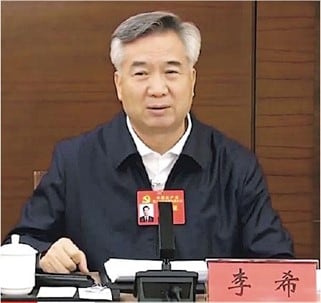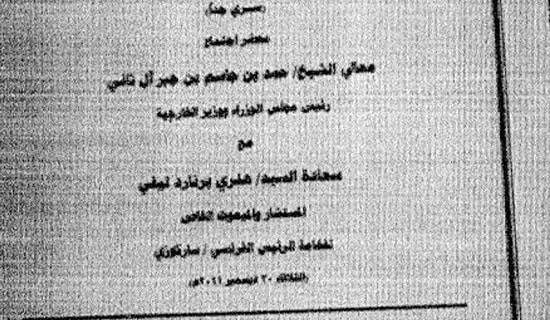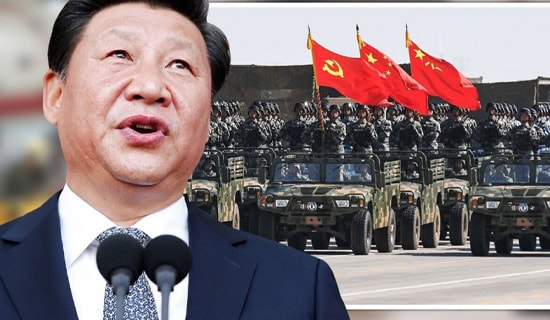This is the ninth and final of a series of reports about the members of the Standing Committee of the Politburo of the Chinese Communist Party (CCP). These men are Chinese President Xi Jinping's closest advisors and the most powerful figures in China.
Li Xi, the focus of this report, was elected to the Standing Committee at the recent 20th National People's Congress and is the seventh-highest ranking politician in the CCP (and the lowest-ranking member of the Standing Committee). Formerly the party chief of Guangdong province, Li Xi has now replaced Zhao Leji[1] as the Secretary of the Central Commission for Discipline Inspection (CCDI), the CCP "anti-corruption" organ responsible for enforcing party rules, regulations, and discipline. Functionally, the CCDI serves the function of controlling and forcing party officials to bend to the will of the CCP Central Committee and of Xi Jinping.

For the previous reports in this series, see MEMRI Inquiry & Analysis No. 1653 about intellectual Wang Huning, MEMRI Inquiry & Analysis No. 1656 about Li Zhanshu, MEMRI Inquiry & Analysis No. 1658 about Li Keqiang, MEMRI Inquiry & Analysis No. 1660 about Wang Yang, MEMRI Inquiry & Analysis No. 1665 about Zhao Leji, MEMRI Inquiry & Analysis Series No. 1667 about Li Qiang, MEMRI Inquiry & Analysis Series No. 1668 about Cai Qi, and MEMRI Inquiry & Analysis Series No. 1669 about Deng Xuexiang. Note that Li Zhanshu, Li Keqiang, and Wang Yang were members of the previous Standing Committee, and were voted out of their positions in October at the 20th National People's Congress. Wang Huning, Zhao Leji, Li Qiang, Cai Qi, and Deng Xuexiang are current Standing Committee members.
Biography
Born on October 16, 1956 in Liangdang County, Gansu Province, Li Xi graduated from the Department of Chinese Language and Literature at China's Northwest Normal University. He later received an MBA from the School of Economics and Management of Tsinghua University in Beijing.
After graduating, Li served successively in the Gansu CCP Provincial Committee's Propaganda Department, General Office, Organization Department, and Secretary's Office. Later, he served as secretary of Xigu District Party Committee of Lanzhou City (the capital of Gansu province), as secretary of the Lanzhou Municipal Committee, on the Lanzhou Party Committee's Standing Committee, as director of the Lanzhou Party Committee's Organization Department, as the deputy secretary of the Lanzhou Party Committee, and as the secretary of the Zhangye Municipal Committee.
SUPPORT OUR WORK

In 2004, Li Xi was transferred to the Gansu Provincial Party Committee, serving as the secretary-general of the General Office, his first ministerial position. Later in the year, he was transferred to the Shaanxi Province – the ancestral home of Xi Jinping – and served on the provincial committee's Standing Committee and as the secretary-general of the provincial committee's General Office. In 2006, he served as the secretary of the Yan'an Municipal Committee, and the following year he was elected as an alternate member of the CCP Central Committee.
After being transferred to Shanghai, China's largest city, in 2011, Li served as a member of the municipal committee's Standing Committee and as the chief of the municipal committee's Organization Department. He was promoted to deputy party secretary of the Shanghai CCP two years later, and the following year he was transferred to the Liaoning Provincial Committee, where he would serve as vice governor – and later party chief and governor – of the Liaoning Provincial People's Government. These were Li's first provincial positions.
At the 19th National People's Congress in 2017, Li Xi, then 61, was elected to the CCP Central Committee's Political Bureau, officially becoming a national-level leader. At the same time, he succeeded Hu Chunhua as CCP chief of Guangdong Province.
Shared Roots With Xi Jinping
Li's hometown of the Yunping Township in Gansu Province's Longnan City was the site where, in 1932, Xi Jinping's father, Xi Zhongxun, launched the "Liangdang Mutiny." In addition, early in his career in Gansu Province during the 1980s, Li Xi served as the secretary of Li Ziqi, who had been from the same town as and close to Xi Zhongxun. Li Ziqi would often visit Xi Zhongxun in Beijing and Shenzhen, and Li Xi would accompany him on these trips. Hence, Li Li and Xi Jinping formed a relationship when they were young.
Li's and Xi's shared roots also mean that they both belong to the small and informal "Shaanxi-Gansu-Ningxia Border Area" faction in the CCP, originally led by Xi Zhongxun and greatly valued by Mao Zedong. This alone is a basis for Xi to have a natural affinity for Li.
When he was the party secretary of Yan'an, Li wisely leveraged his familiarity with Xi's roots and attached great importance to Liangjiahe Village, where Xi had spent his early years as an educated youth. Liangjiahe Village has become a popular pilgrimage site for CCP officials, as the cult of personality around Xi Jinping has been promoted within the CCP in recent years.
Over the years, Li and Xi's relationship grew into a direct and stable political relationship. When Li Xi was party chief in Guandong Province, China's most economically developed region, he had the support and direction of Xi Jinping in launching an "anti-corruption" campaign against local officials who were hostile to Beijing and the CCP Central Committee. This campaign toppled several high-ranking local officials, and according to official CCP reports, during the year Li served as Guandong party chief, the provincial disciplinary authorities investigated 697 provincial officials and 7,724 county-level officials. The "purge" that Li carried out in Guandong, which broke up several interconnected "cliques" of local officials, greatly contributed to Xi Jinping's firm control over Guandong, and likely demonstrated to Xi that Li is a reliable, effective enforcer who can help him complete his consolidation of power in the CCP.
Head Of The CCDI
Li Xi is the new Secretary of the Central Commission for Discipline Inspection (CCDI), the CCP "anti-corruption" organ responsible for enforcing party discipline and for imposing the will of the Xi Jinping and the CCP Central Committee upon party officials at all levels. Widely feared by CCP officials, the powers of the CCDI have been expanded dramatically since Xi Jinping assumed leadership of the CCP in 2012, and it has "vertical" authority that gives it the final say in "disciplinary" matters in the CCP, even against local enforcement committees. The agency has been instrumental to Xi in eliminating political opponents and consolidating power.
The CCDI also has the authority to secretly detain CCP officials without prior court approval, and its jurisdiction covers all aspects of life in China, including the military, industry, agriculture, commerce, and academia.
During the five years that Chinese Vice President Wang Qishan headed the CCDI in Xi's first term, there was a saying in CCP officialdom: "Party officials are not afraid of anything but Old Wang coming to talk to you."
Li Xi's "anti-corruption" campaign as party chief in Guangdong was in effect a dry run for his current job as CCDI chief. In the next five years, under the instruction and leadership of Xi Jinping, it is highly likely that he will further purge the CCP of anti-Xi forces in order to create a favorable intra-party environment that will enable Xi to smoothly implement major policy changes and strategic decisions.
*Chris King is Senior Research Fellow for the MEMRI Chinese Media Studies Project. King was an active participant in the student protests in China in 1989.
[1] See MEMRI Inquiry & Analysis No. 1665, Xi Jinping's Politburo – Part 5: Zhao Leji, November 7, 2022.




